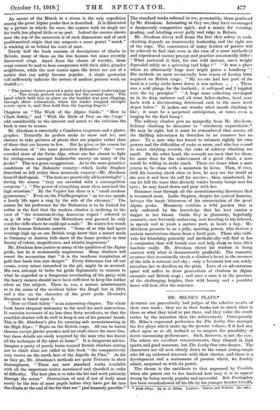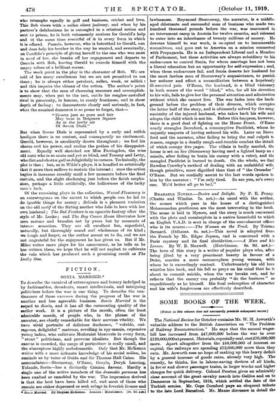MR. MILNE'S PLAYS.*
Aurnons are proverbially bad judges of the relative merits of their own work ; they see in their books not So much what is there as what they tried to put there, and they value the result rather by the intention than the achievement. Consequently Mr. Milne's expressed preference for The Lucky One amongst the five plays which make up the present volume, if it had any effect upon us at all, inclined us to suspect the possibility of desire outrunning performance. Such, however, is not the case. The others are excellent entertainments, they abound in high spirits and good nonsense, but The Lucky One cuts deeper. Tho characters are all seen clearly down to the comic young couple who fill up awkward intervals with their chatter, and there is a development and a seriousness of passion which, we frankly admit, surprised us with its power.
The theme is the antithesis to that expressed by Candida when she points out to her husband how easy it is to appear strong by being merely popular and successful. Bob Farringdon has been overshadowed all his life by his younger brother Gerald, • First Plays. By A. A. Milne. London : Cdatto and Windue. Os. net.]
who triumphs equally in golf and business, cricket and love. This Bob views with a sullen silent jealousy, and when by his partner's defalcations he is entangled in a criminal action and sent to prison, he is both vehemently anxious for Gerald's help and at the same time resentful of it in every form in which It is offered. Pamela, however, who is betrothed to Gerald, can and does help his brother in the way he wanted, and eventually, on Candida's principle of giving herself to the one who was most in need of her, she breaks off her engagement and departs to Canada with Bob, leaving Gerald to console himself with the empty seism of a brilliant career.
The weak point in the play is the character of Bob. We are told of his many excellences but we are not permitted to see them ; he is always either petulant, sullen, weak, or selfish : and this impairs the climax of the action. The author's point is to show that the man of charming manners and accomplish- ments may, when put to the test, outdo his rougher-metalled rival in generosity, in honour, in manly frankness, and in sheer depth of feeling : to demonstrate clearly and seriously, in fact, what the nominal democrat is so prone to forget, that- " Hearts just as pure and fair May beat in Belgeave Square As in the lowly air Of Seven Dials."
But when Seven Dials is represented by a surly and selfish hooligan there is no contest, and consequently no excitement.
Gerald, however, is excellently drawn throughout ; we feel his oharm and his power, and realize the pathos of his disappoint- ment. Equally well sketched are Miss Farringdon, the wise old aunt who is so acute and yet so blind, and Tommy and Letty, who flirt and chatter golf so delightfully in corners. Technically, the plot is thin ; but, as in Wilde's plays, it is handled so artistically that it more than suffices to sustain the interest : once the action begins it increases steadily until a few moments before the final curtain, and the slight slackening just before the finish empha- sizes, perhaps a little artificially, the hollowness of the lucky mans luck.
Of the remaining plays in the collection, 1Vutzel- Flummery is an extravaganza on the extent to which people can be led to do ignoble things for money ; Belinda is a pleasant variation on the old motif of the flirting mother who falls in love with her own husband ; The Red Feathers is an operatic fantasy after the style of Mr. Locke ; and The Boy Comes Home illustrates how men mature and broaden not by years but by moments of intense sensation. They are all excellent fun, superficial, naturally, but thoroughly sound and wholesome of its kind ; we laugh and forget, as the author meant us to do, and we are not ungrateful for the enjoyment he has given us. But if Mr.
Nike writes more plays for his amusement, as he tells us he has written these, we hope that he will not neglect to cultivate the vein which has produced such a promising result as The Lucky One.



































 Previous page
Previous page